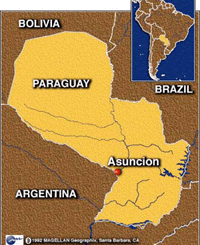
What is the U.S. Military Doing in Paraguay?
The
With

The
With

Nearly a decade ago, Congress passed the Telecommunications Act of 1996 by huge bipartisan margins-91 to 5 in the Senate and 414 to16 in the House. The bill was touted as "the most deregulatory telecommunications legislation in history." President Bill Clinton had become a believer. The Telecom industry was just getting warmed up. Today the threat posed by that industry to what remains of citizen representation looms larger than ever as a new slew of mergers - including the takeover of AT&T by SBC Communications - threatens to sail through the regulatory process.

{mosmedia} On July 18th,
Stein confessed that the army had "unleashed bloodshed and fire to wipe out an entire community," and told the residents that the Berger administration was committed "to push the investigation into the events that occurred to allow for the clarification of what happened and permit us to identify, try and punish the intellectual and material authors of these offenses."

Nearly 140,000 U.S. troops are currently in Iraq trying to influence Iraqi history by waging an imperialist war on behalf of U.S. corporate interests. Yet most people in the United States probably didn't learn very much about Iraqi history in their high school social studies courses. Some knowledge of pre-1950 Iraqi history may be of use to U.S. anti-war activists when arguing with opponents of an immediate withdrawal from Iraq.

GLOBAL
Theroux blames big oil for

{mosmedia} In his book A Language Older Than Words, Derrick Jensen articulates the dilemma of following one’s passions while surviving in a capitalist society: “Wishing away the wage economy did not make it cease to exist, and my determination to stop selling my hours did not lessen my need for food, nor for a place to stay. In other words, despite my highfalutin philosophy, I still had to find a way to earn some cash.” Chris Crass is a political organizer who has grappled with this dilemma for years.
Copyright Toward Freedom 2019